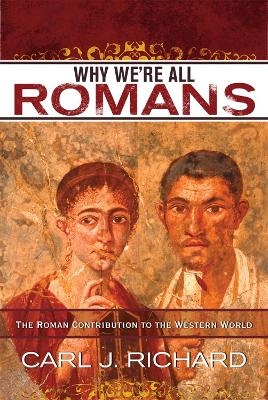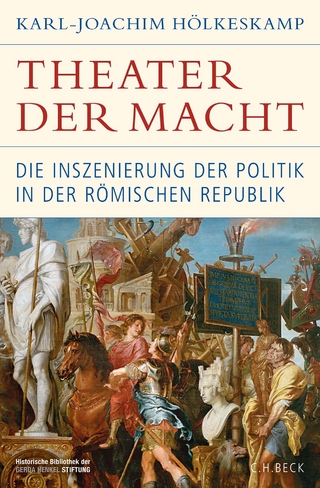
Why We're All Romans
The Roman Contribution to the Western World
Seiten
2010
Rowman & Littlefield Publishers (Verlag)
978-0-7425-6778-8 (ISBN)
Rowman & Littlefield Publishers (Verlag)
978-0-7425-6778-8 (ISBN)
This engaging yet deeply informed work not only examines Roman history and the multitude of Roman achievements in rich and colorful detail but also delineates their crucial and lasting impact on Western civilization. Noted historian Carl J. Richard argues that although we Westerners are "all Greeks" in politics, science, philosophy, and literature and "all Hebrews" in morality and spirituality, it was the Romans who made us Greeks and Hebrews.
As the author convincingly shows, from the Middle Ages on, most Westerners received Greek ideas from Roman sources. Similarly, when the Western world adopted the ethical monotheism of the Hebrews, it did so at the instigation of a Roman citizen named Paul, who took advantage of the peace, unity, stability, and roads of the empire to proselytize the previously pagan Gentiles, who quickly became a majority of the religion's adherents. Although the Roman government of the first century crucified Christ and persecuted Christians, Rome's fourth- and fifth-century leaders encouraged the spread of Christianity throughout the Western world.
In addition to making original contributions to administration, law, engineering, and architecture, the Romans modified and often improved the ideas they assimilated. Without the Roman sense of social responsibility to temper the individualism of Hellenistic Greece, classical culture might have perished, and without the Roman masses to proselytize and the social and material conditions necessary to this evangelism, Christianity itself might not have survived.
As the author convincingly shows, from the Middle Ages on, most Westerners received Greek ideas from Roman sources. Similarly, when the Western world adopted the ethical monotheism of the Hebrews, it did so at the instigation of a Roman citizen named Paul, who took advantage of the peace, unity, stability, and roads of the empire to proselytize the previously pagan Gentiles, who quickly became a majority of the religion's adherents. Although the Roman government of the first century crucified Christ and persecuted Christians, Rome's fourth- and fifth-century leaders encouraged the spread of Christianity throughout the Western world.
In addition to making original contributions to administration, law, engineering, and architecture, the Romans modified and often improved the ideas they assimilated. Without the Roman sense of social responsibility to temper the individualism of Hellenistic Greece, classical culture might have perished, and without the Roman masses to proselytize and the social and material conditions necessary to this evangelism, Christianity itself might not have survived.
Carl J. Richard is professor of history at the University of Louisiana at Lafayette.
Chapter 1: Roman History in Brief
Chapter 2: Administration and Law
Chapter 3: Engineering and Architecture
Chapter 4: Epic and Lyric Poetry
Chapter 5: Speeches, Letters, and Agricultural Manuals
Chapter 6: Philosophy
Chapter 7: Historical Writing
Chapter 8: Comedy and Satire
Chapter 9: Greek and Jewish Contributions in the Roman Era
Chapter 10: The Rise and Romanization of Christianity
Epilogue
Suggestions for Further Reading
| Erscheint lt. Verlag | 16.8.2010 |
|---|---|
| Verlagsort | Lanham, MD |
| Sprache | englisch |
| Maße | 161 x 240 mm |
| Gewicht | 542 g |
| Themenwelt | Geschichte ► Allgemeine Geschichte ► Altertum / Antike |
| ISBN-10 | 0-7425-6778-8 / 0742567788 |
| ISBN-13 | 978-0-7425-6778-8 / 9780742567788 |
| Zustand | Neuware |
| Haben Sie eine Frage zum Produkt? |
Mehr entdecken
aus dem Bereich
aus dem Bereich
die Inszenierung der Politik in der römischen Republik
Buch | Hardcover (2023)
C.H.Beck (Verlag)
CHF 67,20
Buch | Hardcover (2024)
Klett-Cotta (Verlag)
CHF 69,95


